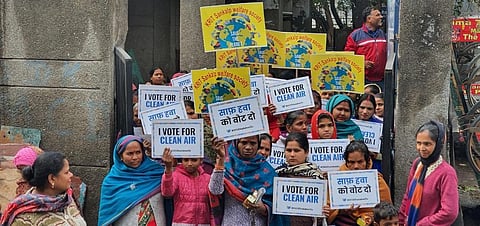Delhi elections: How important an issue is environment
With the upcoming Delhi legislative elections, citizen groups have elevated the dialogue on air pollution and made it an election issue.
The momentum built by citizen groups, health practitioners and experts has taken years to reach its current scale. However, within the last few weeks, over two lakh citizens in almost 50 constituencies have symbolically cast their vote for clean air.
Demands for clean air have been escalated not only to the candidates in the state elections, but has also made an impact in the Union Budget 2020-21.
2020 represents the first year that air pollution has taken the spotlight, not just in citizen campaigns, but for election candidates and major party manifestos. To address public sentiment and a looming air quality crisis, all major political parties have committed to combating air pollution in their manifestos, albeit in varying degrees.
The Aam Admi Party (AAP) has focused on public transport, promising 11,000 new buses for the city and two crore new trees to supplement green cover. The party has set a target to reduce air pollution 65 per cent by 2024.
The Bharatiya Janata Party (BJP) also promised to increase the bus fleet, and their network of smog towers around the city. They have also included incentives for electric vehicles and solar energy and a more comprehensive public transport system.
Congress has released an extremely comprehensive manifesto with goals for public transport that accommodates 80 per cent of the population, allocating a quarter of the annual budget to tackling air pollution, increasing the city’s green cover and funding stubble-to-energy technology. For the first time, it has a section completely devoted to environmental issues.
However, no party has committed to ensuring pollution levels don’t reach severe levels in 2020-25. The issue of emissions compliance of thermal power plants has also not been addressed by any party. Various studies have attributed air pollution in Delhi to emissions from thermal power plants in the vicinity of the state.
The recent announcement of the Union Budget allocated over Rs 4,400 crore to tackling air pollution. Despite this, the current pricing and taxation regime continues to work against clean fuels and public transport.
The new budget has ignored these key areas of interventions. Finance Minister Nirmala Sitharaman’s acknowledgement that air pollution in cities is a problem, is a step in the right direction.
The fact that air pollution has featured prominently in each party manifesto, and had a special mention in the budget must be attributed to the strong citizen push towards solutions. One of these is the ‘Dilli Dhadakne Do’ campaign led by ‘My Right to Breathe’. To ensure specific demands and interventions were addressed in party manifestos, citizen groups launched this campaign with a ‘Clean Air Manifesto’.
The manifesto was based on URJA’s ‘People’s Green Manifesto 2020’ and was created to prioritise solutions specific to tackling air pollution. The manifesto, which contains nine solutions to tackle the air quality, was generated by demands of Delhi residents and further refined by experts.
There are many stories of residents whose health and lifestyle has been impacted by air pollution. Women, children, sanitation workers, waste pickers and auto drivers are some of the communities most at risk from air pollution. The most vocal voices against air pollution are from these groups.
Volunteers engaged with voters and political candidates and found that many residents and politicians do not have a complete understanding of the causes and solutions for air pollution. Recently, a smog tower was inaugurated in Delhi and was cited as a “solution”.
However, one smog tower unit would clean just 0.000072 per cent of Delhi’s air. The entire city would need more than 14 lakh units. Hence, the Clean Air Manifesto was also aimed at guiding the solutions that would get the focus of different parties.
As a result of the campaign, 48 different political leaders from the AAP, BJP and Congress pledged to work for clean air. It remains to be seen if they follow up on these promises once the new government is formed.
No matter who gets elected, Delhi residents know that they can hold their leaders accountable to their pledges. This time, citizens of Delhi will vote for their right to clean air.


